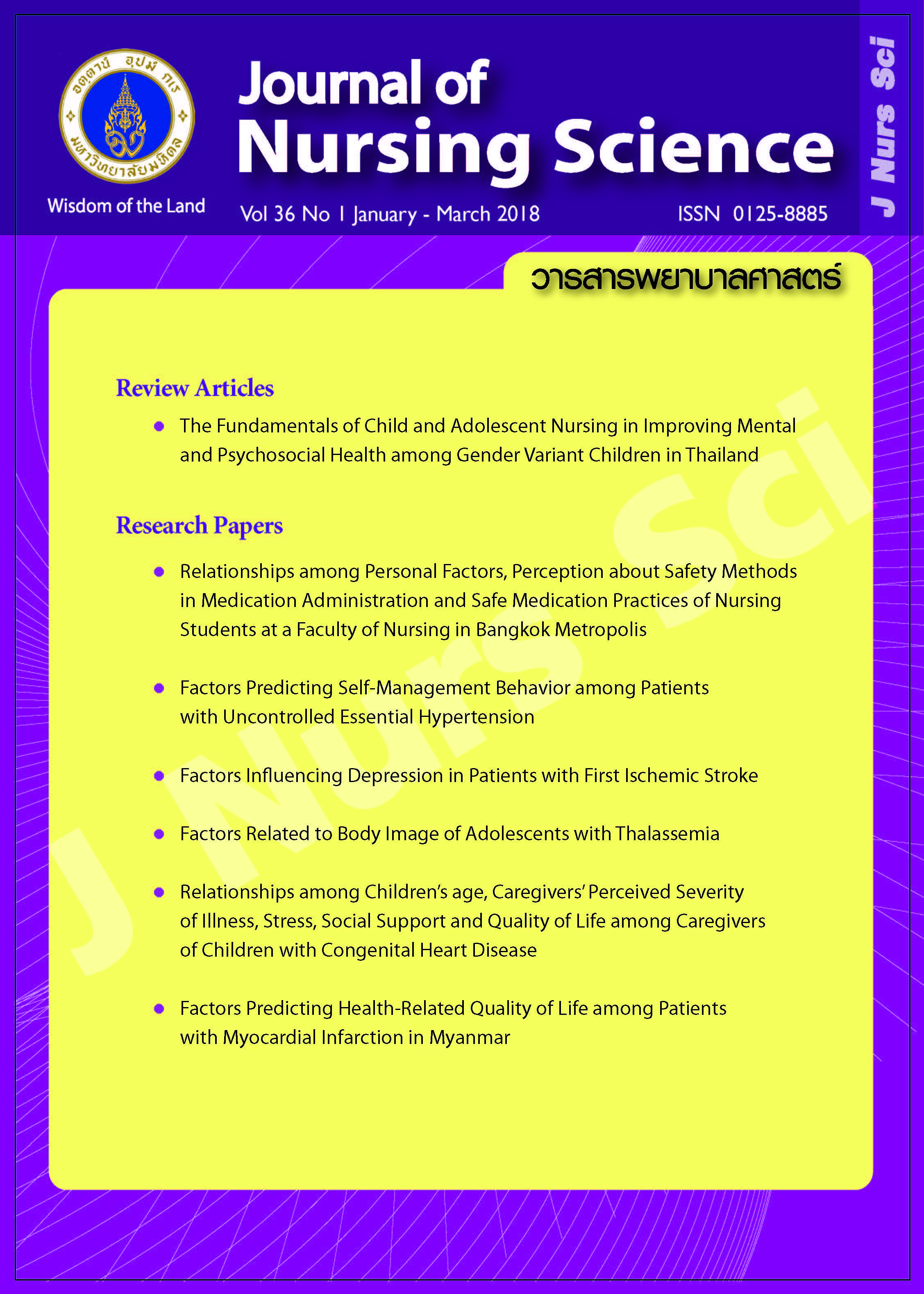Factors Predicting Self-Management Behavior among Patients with Uncontrolled Essential Hypertension
Main Article Content
Abstract
Purpose: To study self-management behavior and predictive power of age, gender, education level, health literacy, social support, and patient-provider communication on self-management behavior among patients with uncontrolled essential hypertension.
Design: Correlational predictive study.
Methods: The sample consisted of 84 patients with uncontrolled essential hypertension whose blood pressure was 140/90 mmHg or higher. The subjects were recruited from 3 public health centers, under Bangkok Health Department, Bangkok Metropolitan Administration. A convenience sampling was used to recruit 84 subjects. Data were collected using questionnaires including personal data and treatment, Multidimensional Scale of Perceived Social Support, Health Literacy assessment Scale, Patient-provider Communication Questionnaire, and Self-management Behavior Questionnaire. The reliability of the questionnaires were .88, .81, .84, and .90, respectively. Data were analyzed using descriptive statistics and multiple regressions with stepwise method.
Main findings: Self-management behavior of patients with uncontrolled essential hypertension was at a low level ( = 2.00, SD = 1.09). Social support was the single best predictor (step 1), 15.10% of the variance was accounted and health literacy was the next best predictor, after social support was included in the model (step 2). Health literacy accounted for an additional 8.1% (R2 change = .081) of the variability. Altogether, they could explain 23.20% of variability in self-management (R2 = .232, F = 12.259, p < .001). Social support was the most important predictor of self-management behavior among patients with hypertension (β = .368, p < .001), followed by health literacy (β = .285, p = .005)
Conclusion and recommendations: The study finding could be used as a guideline for
healthcare providers, in particular to nurses, for developing a self-management behavioral program for patients with hypertension by enhancing social support and promoting health literacy to practice self-management behavior effectively.
Article Details
Copyright Notice: Nursing Science Journal of Thailand has exclusive rights to publish and distribute the manuscript and all contents therein. Without the journal’s permission, the dissemination of the manuscript in another journal or online, and the reproduction of the manuscript for non-educational purpose are prohibited.

Disclaimer: The opinion expressed and figures provided in this journal, NSJT, are the sole responsibility of the authors. The editorial board bears no responsibility in this regard.
References
His Majesty the King Office of Printing Mill; 2016. (in Thai).
2. National Health Security Office. National Health Security Office (NHSO) Annual report: fiscal year 2015. 1st ed. Bangkok: National Health Security Office; 2016. (in Thai).
3. Bengtsson U. Self-management in hypertension care. Göteborg, Sweden: Institute of Health and Care Sciences, University of Gothenburg; 2015. 85 p.
4. Riegel B, Carlson B. Facilitators and barriers to heart failure self-care. Patient Educ Couns. 2002;46(4):287-95.
5. Akhter N. Self-management among patients with hypertension in Bangladesh [master’s thesis]. Songkhla: Prince of Songkla University; 2010. 79 p.
6. Orem DE. Nursing concepts of practice. 4th ed. St.Louis: Mosby-Year Book; 1991.
7. Lee JE, Han HR, Song H, Kim J, Kim KB, Ryn JP, et al. Correlates of self-care behaviors for managing hypertension among Korean Americans: a questionnaire survey. Int J Nurs Stud. 2010;47(4):411-17.
8. Yang SO, Jeong GH, Kim SJ, Lee SH. Correlates of self-care behaviors among low-income elderly women with hypertension in South Korea. J Obstet Gynecol Neonatal Nurs. 2014;43(1):97-106.
9. Juntanon N, Singchai B, Worawong W. Self-care behavior of hypertension patients who live in Mueang District, Chumphon Province. Khon Kaen University Research Journal. 2011;16(6):749-58. (in Thai).
10. Sujamnong S. Factors related to selfmanagement of hypertensive patients, Taladkwan District Health Promoting Hospital, Nonthaburi Province. Journal of Boromarajonani College of Nursing. 2013;29(2):20-30. (in Thai).
11. Chang AK, Lee EJ. Factors affecting self-care in elderly patients with hypertension in Korea. Int J Nurs Pract. 2015;21(5):584-91.
12. McNaughton CD, Jacobson TA, Kriplani S. Low literacy is associated with uncontrolled blood pressure in primary care patient with hypertension and heart disease. Patient Educ Couns. 2014;96(2):165-70.
13. Schoenthaler A, Chaplin WF, Allegrante JP, Fernandez S, Diaz-Gloster M, Tobin JN, et al. Provider communication effects medication adherence in hypertensive African Americans. Patient Educ Couns.
2009;75(2):185-91.
14. Zimet GD, Dahlem NW, Zimet SG, Farley GK. The multidimensional scale of perceived social support. J Pers Asses. 1988;52(1):30-41.
15. Thai Hypertension Society. The guidelines on the treatment of hypertension 2012: update 2015. Bangkok: Thai Hypertension Society; 2015. (in Thai).
16. Cohen J. Statistical power analysis for the behaviolal seiences. 2nd ed. Hillsdale, NJ: Lawrence Erlbaum Associates; 1988.
17. Pissamai B, Therawiwat M, Imanee N, Aree-ue S. Factors related to selfmanagement behaviors for persons with osteoarthritis. Journal of Public Health. 2012;42(2):54-67. (in Thai).
18. Wongpakaran N, Wongpakaran T, Ruktrakul R. A revised Thai Multi-Dimensional Scale of Perceived Social Support (MSPSS): Thai version. Clin Pract Epidemiol Ment Health. 2011;7:161-6.
19. Jindawong B, Bumreeaj S, Luvira V, Kuhiranyaratn P. Functional health literacy in patients at Srinagarind Hospital, Khon Kaen Province. In: 15th Graduate Research Conference; 28 March 2014; College of Local Administration, Khon Kaen University. Khon Kaen: Graduate School Khon Kaen University; 2014. p.1855-65. (in Thai).
20. Stewart AL, Nápoles-Springer AM, Gregorich SE, Santoyo-Olsson J. Interpersonal process of care: patient-reported measures for diverse groups. Health Serv Res. 2007;42(3 Pt1):1235-56.
21. Bokhour BG, Cohn ES, Cortés DE, Solomon JL, Fix GM, Elwy AR, et al. The role of patients’ explanatory models and daily-lived experience in hypertension selfmanagement. J Gen Intern Med. 2012;27(12):1626-34.
22. Truong PV, Jullamate P, Piphatvanitcha N. Factors related to self-management behaviors in hypertension older adults in Haiduong Province, Vietnam. Journal of Nursing and Health Sciences. 2016;10(3):56-64.
23. Kara Kaşikçi M, Alberto J. Family support, perceived self-efficacy and self-care behavior of Turkish patients with chronic obstructive pulmonary disease. J Clin Nurs. 2007;16(8):1468-78.
24. Hongkrajok H. Influences of health literacy, perceived self-efficacy, and patientshealth care provider communication on self-care behaviors among patients with primary hypertension [master’s thesis]. Chonburi: Burapa University; 2016. 93 p. (in Thai).


